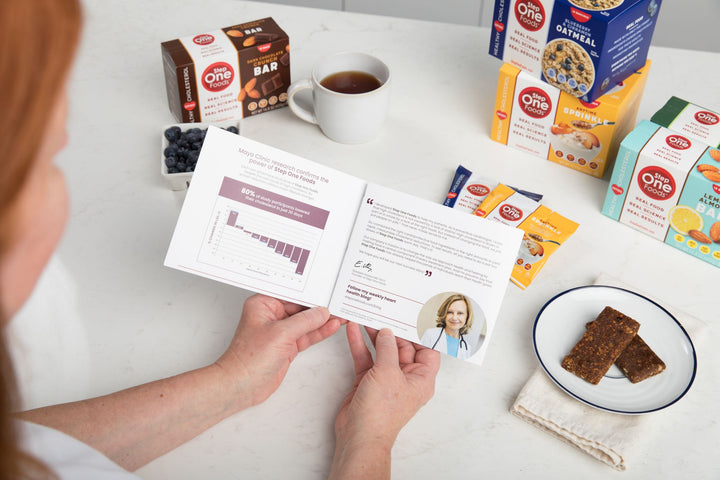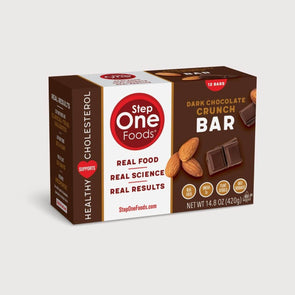

Get Help With Your Heart Disease and High Cholesterol Symptoms
Heart disease is the leading cause of death in the United States, and high cholesterol is a major risk factor. The link between the two is strong, so it’s important to treat and manage high cholesterol if you’ve been diagnosed with this condition. In this guide, we’ll dive into how heart disease and cholesterol are related, the different types of heart disease and how Step One Foods can help lower cholesterol. Read on to learn more.
How Are They Related?
Cholesterol is often viewed as inherently bad, but the truth is our body needs cholesterol for cell health and other essential functions. The issue with cholesterol begins when there are excessive amounts of it in the bloodstream, particularly LDL (bad) cholesterol.
Heart disease encompasses a large range of heart and vascular conditions. By far, the most common of these is atherosclerosis or arteriosclerosis and high cholesterol is closely linked to it. This is because elevated cholesterol levels can lead to plaque buildup along arterial walls, the hallmark of atherosclerosis. This narrows the passage for blood flow and makes the arteries more vulnerable to additional injury potentially leading to cardiovascular events like heart attack and stroke. It also increases the workload on the heart, potentially leading to conditions like heart failure. Heart attack, stroke and heart failure are some of the most common causes of death and disability in the Western world.
This direct link between heart disease and high cholesterol underlines the need to address high cholesterol and lower your cholesterol levels as soon as you’re diagnosed.
What Is Heart Disease?
Heart disease is an umbrella term for a variety of conditions that affect the heart’s ability to function. The most common type of heart disease is coronary artery disease, which affects blood flow to the heart.
Fortunately, many forms of heart disease can be prevented or treated. With that in mind, let’s take a look a closer look at heart disease.
Common Signs & Symptoms
Catching heart disease or heart disease-related conditions in the early stages is best for early intervention and management. The signs and symptoms of heart disease will depend on the form of heart disease.
For the most part, heart disease tends to be silent and go unnoticed until the condition is advanced. This isn’t always the case, but some symptoms that could point to heart disease include:
- Heart attack
- Chest pain or tightness (angina)
- Fluttering or palpitations of the heart (arrhythmia)
- Shortness of breath
- Pain or weakness in the legs and arms
- Heart failure
Any of these could have a significant deleterious effect on quality of life - and life span. Ideally, heart issues are caught before this can happen. This is why it’s important to get regular checkups and diagnostic tests with your doctor, especially if you fall into a risk category for heart disease.
What Are the Causes?
The cause of heart disease depends on the type of disease. But, the most common possible causes include:
- Lifestyle choices
- Genetics
- Other underlying conditions
- Environmental factors
What Are Different Types of Heart Disease?
Next, let’s take a look at the most common types of heart disease.
Coronary Artery Disease (CAD)
Coronary Artery Disease (CAD) is the most common type of heart disease. CAD occurs when heart arteries have trouble supplying your heart with the blood, oxygen and nutrients it needs. Your heart is a muscular organ and just like your leg muscles need oxygen and nutrients so they can run, your heart muscle needs oxygen and nutrients so it can beat. CAD is brought on by atherosclerosis, which is the buildup of plaques in artery walls that we touched on earlier.
As plaque builds up, the blood vessels supplying your heart muscle harden and narrow, causing the heart to receive less blood. At a certain point blood supply will be insufficient to meet the heart’s oxygen and nutrient demands leading to symptoms such as chest discomfort or breathlessness with activity. Plaque build up can also make the artery walls more susceptible to injury, resulting in a heart attack. T.
Heart Valve Disease
Heart valve disease occurs when one or more of the four heart valves aren’t working properly. These valves regulate the heart’s blood flow, opening and closing to allow orderly blood circulation through the heart’s chambers. Heart Valve Disease may cause valves to not open properly (stenosis) or close properly (regurgitation).. High cholesterol has been linked to the development of valve stenosis.
Heart Arrhythmias
Heart arrhythmias are irregular heartbeats. The heart can beat too quickly, too slowly or irregularly. Arrhythmias can range from harmless to life-threatening. For instance, your heart speeding up during exercise would be considered normal. Frequent, chronic or sudden arrhythmias, especially accompanied by other symptoms, may require medical attention. High cholesterol does not cause arrhythmias directly. But heart muscle damage from a heart attack or inadequate blood flow to heart muscle due to CAD can predispose to heart arrhythmias.
Heart Failure
Heart failure does not mean your heart has stopped beating. Rather, this term is used to describe the situation where your heart is unable to pump enough blood to meet the oxygen and nutrient demands of the rest of your body. Your risk for heart failure can increase if you have other heart conditions, like CAD. Heart failure is a serious condition and needs comprehensive treatment to improve symptoms.p>
Risk Factors & Complications
Numerous risk factors increase your likelihood of developing heart disease. These risk factors include:
Age - Your risk for heart disease increases as you get older.
Sex - Men typically have a higher risk for heart disease, but women’s risk increases rapidly after menopause.
Genetics - A family history of heart disease can increase risk.
Lifestyle habits - Lifestyle factors like an unhealthy diet, lack of exercise, stress, smoking, and excessive alcohol consumption can increase your risk of heart disease.
Medical conditions - Medical conditions like high cholesterol, high blood pressure, diabetes, and obesity can increase your risk of heart disease.
Heart disease can cause numerous health complications, including life-threatening issues like heart attack and stroke.
Testing & Diagnosis
To test for and diagnose heart disease, a health care provider will conduct a comprehensive exam that includes an evaluation of your medical history and family history, a physical examination and diagnostic tests. Diagnostic tests may include blood tests, chest X-rays and specific heart tests like electrocardiograms, echocardiograms, exercise tests, CT scans and even MRIs.
What is High Cholesterol?
High cholesterol is a condition that occurs when too much cholesterol is circulating in the bloodstream. Cholesterol is a type of waxy fat that our body needs to perform certain functions, but too much of certain types of cholesterol can significantly increase your risk for developing heart disease.
Common Signs & Symptoms
High cholesterol is typically asymptomatic and requires a blood test to be diagnosed. This is why it’s important to regularly check your cholesterol levels at primary care appointments, especially if you are in a risk category for high cholesterol.
What Are the Causes?
There are various lifestyle choices that can lead to high cholesterol. These include:
Tobacco use - Smoking can increase the levels of LDL (bad) cholesterol and lower HDL (good) cholesterol in the bloodstream.
Diet - A diet heavy in saturated fats and added sugars can raise LDL cholesterol. Some foods to avoid or reduce include red meat, baked goods and fried foods.
Excessive alcohol consumption - Alcohol can raise your cholesterol levels.
Sedentary lifestyle - Being sedentary and not getting enough exercise can raise cholesterol levels.
Good Cholesterol (HDL) vs. Bad Cholesterol (LDL)
The two main types of cholesterol are HDL and LDL cholesterol.
High-density lipoprotein (HDL) cholesterol is known as the “good” cholesterol and helps move cholesterol out of your body.
Low-density lipoprotein (LDL) cholesterol is known as the “bad” cholesterol and can contribute to plaque buildup in your arteries, increasing your risk for heart disease.
Risk Factors & Complications
Certain risk factors like lifestyle habits, certain health conditions, certain medications, genetics, age and being overweight or obese can increase your likelihood of developing high cholesterol. Heart disease is one of the primary complications that can arise from having high cholesterol levels.
Testing & Diagnosis
Blood tests can measure your cholesterol levels. These tests can measure your HDL, LDL and triglycerides, another type of fat. If your provider diagnoses you with high cholesterol, they can begin a treatment plan to try and lower these levels.
When To See a Doctor
It’s important to seek emergency medical attention if you experience symptoms of heart disease like chest pain, shortness of breath or palpitations.
For both heart disease and high cholesterol, early detection is best for the treatment and management of symptoms. It’s a good idea to test for these conditions regularly, as the vast majority of heart disease can be prevented and high cholesterol can be reversed. You should especially get regular testing if you fall into any of the risk categories for high cholesterol and heart disease.
Treatment & Common Medications
Both heart disease and high cholesterol require multifaceted approaches to treat the condition.
Generally, lifestyle changes are recommended for both heart disease and high cholesterol. Adopting a heart-healthy diet is the cornerstone of every treatment plan, as eating more plant-based foods and cutting out foods high in saturated fats, added sugars and sodium will benefit heart health and help reduce cholesterol.
Exercise is also recommended for both heart disease and high cholesterol. However, you should talk about your exercise routine with your primary care provider if you have a heart condition. They can help guide you through the best routine for your condition. Other lifestyle changes may include stress management, healthy sleep habits, quitting smoking and limiting alcohol consumption. Your doctor will also likely recommend a weight management program if you are overweight or obese, as carrying excess weight can have a negative impact on heart health.
Prescription medications may also play a role in treating high cholesterol and heart disease. Statins are commonly prescribed for cholesterol-lowering. For heart disease, the medications prescribed will depend on the specific condition that is being addressed.
Finally, surgery may be part of heart disease treatment. If possible, other paths of treatment are typically followed before resorting to surgery.
Healthy Diet & Lifestyle Tips To Follow
Embracing a heart-healthy lifestyle is essential for individuals with heart disease, high cholesterol or both.
As mentioned, a heart-healthy diet rich in fruits, vegetables, whole grains and lean proteins is recommended. Engaging in regular physical activity, quitting smoking and limiting alcohol are also important.
If you have high blood pressure, high cholesterol or diabetes, it’s essential to manage these to avoid exacerbating heart disease or increasing your risk of developing heart disease.
Losing weight, managing stress and practicing healthy sleep and lifestyle habits can also help.
Customer Favorites
Frequently Asked Questions
The tips for lowering cholesterol are very similar to the tips for reducing blood pressure. Focus on lifestyle changes like a heart-healthy diet, exercising, quitting smoking, limiting alcohol consumption and losing weight if necessary. Your doctor may also prescribe medications like statins to help control cholesterol levels.
High cholesterol can be purely genetic. Familial hypercholesterolemia is a relatively rare inherited condition that affects how your body processes cholesterol. In most people, even when a genetic predisposition is present, lifestyle factors are major contributors to abnormal cholesterol levels.

Learn How Step One Foods Can Help You Lower Your Cholesterol Levels
Step One Foods are clinically formulated to help lower cholesterol by incorporating essential cholesterol modulating nutrients like plant sterols, fiber, antioxidants and Omega-3s into every serving. There are various items to choose from, including bars, smoothies, pancake mixes and oatmeal. Given that eating right for cholesterol means that you’re also eating right to lower blood pressure, normalize blood sugar and support weight loss, these items are not only appropriate for those with high cholesterol, but anyone at increased risk for developing heart disease.
Adding Step One Foods into your diet is simple. Just exchange something similar you’re already eating with two Step One Foods items per day. It’s a great way to ensure you’re getting the right nutrients from the right ingredients in the right amounts to support your heart disease prevention efforts. Shop our online store and order your Step One Foods solution today!



